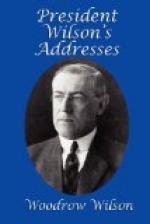[Address at the Suffrage Convention, Atlantic City, New Jersey, September 8, 1916.]
MADAM PRESIDENT, LADIES OF THE ASSOCIATION:
I have found it a real privilege to be here to-night and to listen to the addresses which you have heard. Though you may not all of you believe it, I would a great deal rather hear somebody else speak than speak myself; but I should feel that I was omitting a duty if I did not address you to-night and say some of the things that have been in my thought as I realized the approach of this evening and the duty that would fall upon me.
The astonishing thing about the movement which you represent is, not that it has grown so slowly, but that it has grown so rapidly. No doubt for those who have been a long time in the struggle, like your honored president, it seems a long and arduous path that has been trodden, but when you think of the cumulating force of this movement in recent decades, you must agree with me that it is one of the most astonishing tides in modern history. Two generations ago, no doubt Madam President will agree with me in saying, it was a handful of women who were fighting this cause. Now it is a great multitude of women who are fighting it.
And there are some interesting historical connections which I would like to attempt to point out to you. One of the most striking facts about the history of the United States is that at the outset it was a lawyers’ history. Almost all of the questions to which America addressed itself, say a hundred years ago, were legal questions, were questions of method, not questions of what you were going to do with your Government, but questions of how you were going to constitute your Government,—how you were going to balance the powers of the States and the Federal Government, how you were going to balance the claims of property against the processes of liberty, how you were going to make your governments up so as to balance the parts against each other so that the legislature would check the executive, and the executive the legislature, and the courts both of them put together. The whole conception of government when the United States became a Nation was a mechanical conception of government, and the mechanical conception of government which underlay it was the Newtonian theory of the universe. If you pick up the Federalist, some parts of it read like a treatise on astronomy instead of a treatise on government. They speak of the centrifugal and the centripetal forces, and locate the President somewhere in a rotating system. The whole thing is a calculation of power and an adjustment of parts. There was a time when nobody but a lawyer could know enough to run the Government of the United States, and a distinguished English publicist once remarked, speaking of the complexity of the American Government, that it was no proof of the excellence of the American Constitution that it had been successfully operated, because the Americans could run any constitution. But there have been a great many technical difficulties in running it.




